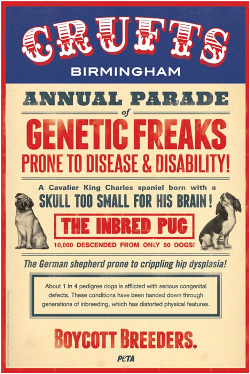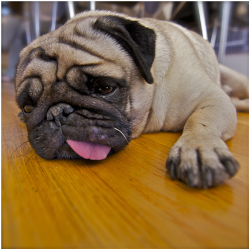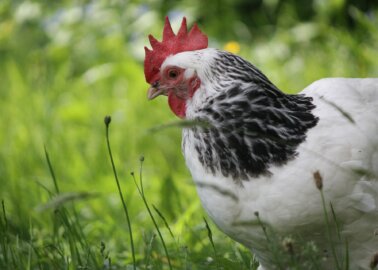Crufts – Last Year’s Top 10 So-Called ‘Winners’
 The animals crowned as “winners” at dog shows like Crufts are more likely to be major losers – in the genetic lottery, that is. “Purebred” is a euphemism for “inbred”: in some cases, pedigrees come from a gene pool of only about 50 dogs, meaning that these unfortunate pooches are riddled with painful inherited diseases and may live for only half as long as their healthy mixed-breed cousins.
The animals crowned as “winners” at dog shows like Crufts are more likely to be major losers – in the genetic lottery, that is. “Purebred” is a euphemism for “inbred”: in some cases, pedigrees come from a gene pool of only about 50 dogs, meaning that these unfortunate pooches are riddled with painful inherited diseases and may live for only half as long as their healthy mixed-breed cousins.
What’s more, the exaggerated features that breeders and competition judges prize, such as a squashed-in face, a narrow skull or disproportionately short legs, are actually deformities that can leave dogs unable to lead normal lives. Aggressive selective breeding promotes survival of the unfittest and results in dysfunctional animals. And mixed-breed dogs suffer, too – because every time a family buys a puppy from a breeder, a dog languishing in an animal shelter loses his or her chance at being adopted.
Here’s what Crufts didn’t tell you about the dog breeds it gave awards to at last year’s show:
1. Lhasa Apso (Winner, Best in Show)
They may have originated in the Tibetan Himalayas, but in this country, Lhasas are not well adapted. Their overly thick coats affect their quality of life, as they overheat in warm weather, while common hereditary afflictions include skin disease, glaucoma, cataracts, water on the brain and kidney disease.
2. Newfoundland (Reserve, Best in Show)
The sheer size of these unnatural giants results in joint problems, such as disabling hip pain, and often causes them to die at a young age. Their characteristically deep jowls can make them drool uncontrollably, and they also have a strong predisposition to sub-aortic heart disease and cystinuria (kidney stones).
3. Irish Water Spaniel (Winner, Gundog Group)
These dogs may have a reputation for being clownish, but from ear infections to epilepsy, their health issues are no joke. Their tails are easily bloodied, and problems such as hypothyroidism and distichiasis (ingrown eyelashes) are common.
4. Borzoi (Winner, Hound Group)
Borzois are often described as elegant, but their long, thin legs are prone to fractures, and their deep chests make them susceptible to bloat, a life-threatening stomach condition.
5. Old English Sheepdog (Winner, Pastoral Group)
Don’t let breeders tell you a shaggy dog story about this floppy-haired fellow. Prone to deafness, hip dysplasia, cataracts, diabetes and cancer, this breed is far from fighting fit.
6. Norwich Terrier (Winner, Terrier Group)
Skin problems, knee problems (eg, luxating patellas), eye problems (eg, lens luxation), breathing problems (eg, collapsing tracheas) … these tiny terriers’ common ailments affect their enjoyment of life in every way.
7. Pomeranian (Winner, Toy Group)
Pomeranians’ short muzzles leave them in danger of a collapsing trachea, a chronic condition in which the windpipe caves in, making it hard to breathe. They’re also susceptible to “black skin disease”, poor teeth, “floating kneecaps” and hip problems. Not a pretty picture, when you think about it.
8. Keeshond (Reserve, Utility Group)
These Dutch dogs’ downfall is most often their heart – they are prone to a range of severe cardiac conditions, including mitral valve defects, patent ductus arteriosus and ventricular septal defects. They can also get the hormone disorder Addison’s disease.
9. Siberian Husky (Reserve, Working Group)
Huskies’ thick coats keep them a little too warm outside their native Siberia – they can get so hot that they’re only able to exercise at night. Because of a number of congenital eye defects, such as goniodysgenesis and progressive retinal atrophy, they’re often in danger of going blind as well.
10. Pug (Reserve, Toy Group)
It may sound harsh to call pugs “genetic freaks”, but given the list of severe ailments that they’re prone to, including liver defects, blocked airways as a result of their squashed nostrils, infections in their wrinkly skin, sight problems caused by their bulging eyes and being born with a deformed spine or deformed hips, it’s no exaggeration. There’s even a disease named after them – the horrible “pug dog encephalitis”, an inflammation of the brain that leads to seizures and death.
Please don’t perpetuate canine eugenics by buying a potentially ill dog from a breeder – if you’re looking for a new animal companion, you need look no further than the lovable mutts waiting at your local animal shelter for a loving home.




